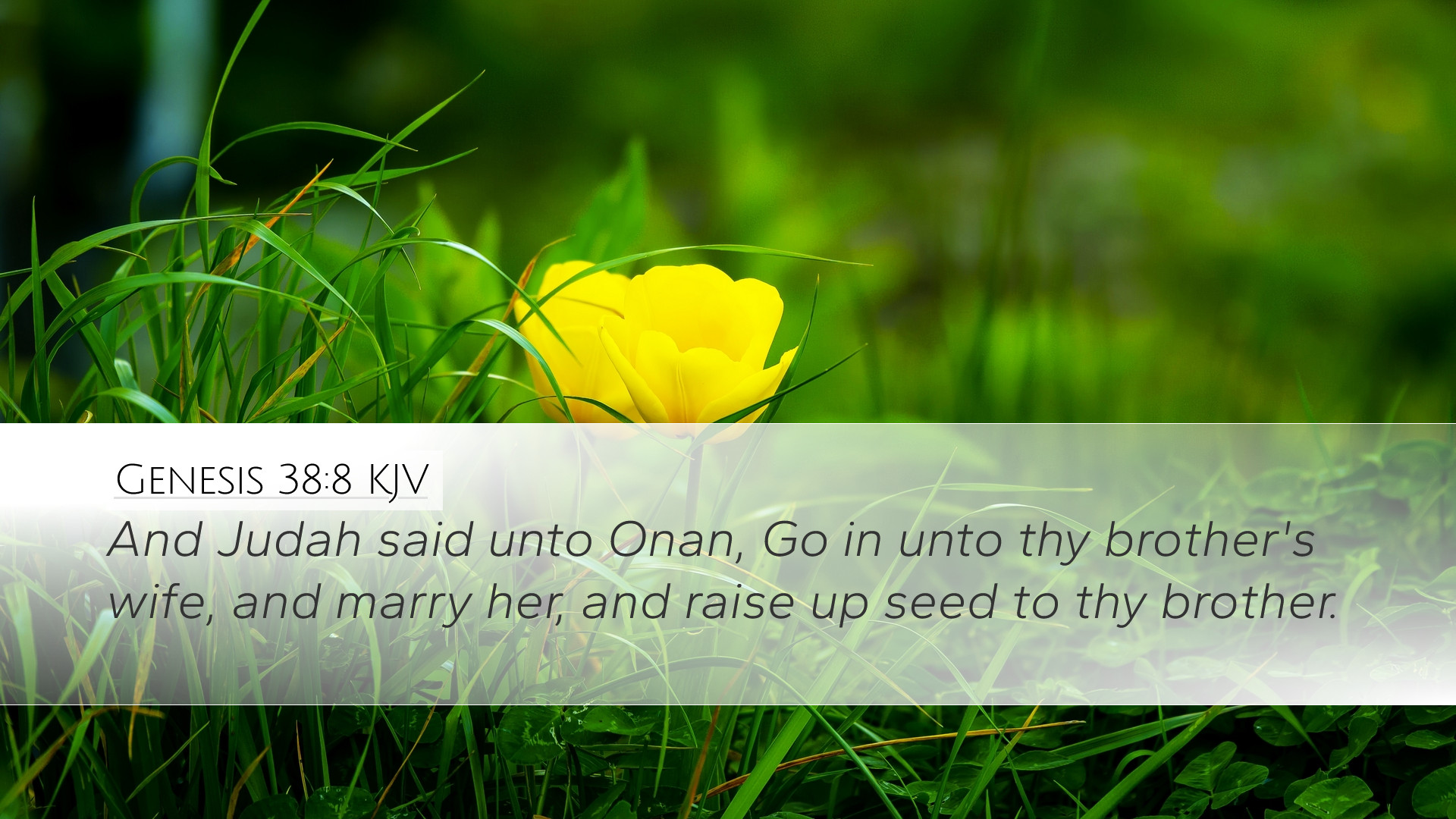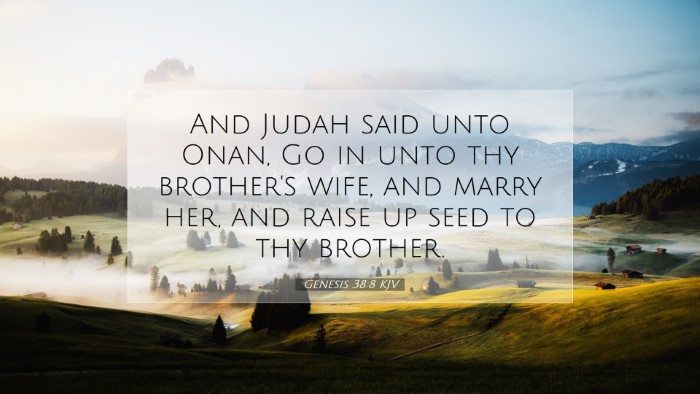Commentary on Genesis 38:8
Verse: Genesis 38:8
“And Judah said unto Onan, Go in unto thy brother's wife, and marry her, and raise up seed to thy brother.”
Introduction
Genesis 38 presents a stark contrast to the narrative of Joseph that encompasses much of Genesis 37 and onward. The chapter focuses on Judah, one of the twelve sons of Jacob, and tells a story filled with moral complexities and social implications. Genesis 38:8 is pivotal as it introduces the Levirate marriage, a practice fundamental in preserving the lineage and inheritance in ancient Israel. This verse invites profound theological reflections regarding duty, family, and the divine plan.
The Context of Genesis 38
Before delving into verse 8, understanding the broader context is essential. The chapter discusses Judah's departure from his brothers and his subsequent interactions, including marrying a Canaanite woman, Shua, and having three sons: Er, Onan, and Shelah. The narrative becomes progressively complex with the introduction of Tamar, Er's widow, and the duties associated with Levirate marriage.
Levirate Marriage in Ancient Israel
The stipulation outlined in this verse reflects a practice rooted in the Law (Deuteronomy 25:5-10) although Genesis precedes the codification of the Law. The practice aimed to ensure that the deceased brother's lineage continued through his widow, thereby maintaining land and inheritance within the family. Matthew Henry observes that the encouragement of Onan's responsibility was an act that honored both the deceased and the family unit.
- Role of Onan: Onan is called to fulfill his duty towards Tamar, which carries significant implications for family integrity and social responsibility.
- Judah's Authority: Judah's instruction reflects patriarchal authority in ancient societies, illustrating how familial duties were integral to cultural identity.
Theological Insights
Judah’s command to Onan sets the stage for a deeper understanding of themes such as responsibility, obedience, and the sovereignty of God over human affairs. In this context, Albert Barnes emphasizes God's providential plan for Israel even amidst human failure and disobedience, as this story eventually leads to the lineage of David and ultimately, Jesus Christ.
Family and Duty
This verse raises questions about familial obligations and social ethics. As religious leaders implore congregations to fulfill their commitments, the implications of Judah's command serve as a reminder of God's expectations for His people in community dealings. Adam Clarke points out that this duty extends beyond mere obligation; it is a reflection of one's faith in God's promise to sustain and fulfill the lineage of His people.
Judah as a Foreshadowing Figure
Judah's character throughout this chapter is foundational. His actions not only demonstrate a blend of human frailty and divine use but also foreshadow the redemptive work of Christ. The call for Onan to marry Tamar is not merely about preservation of seed but forebodes the involvement of the Messiah in God's plan of redemption through unexpected means.
Moral and Ethical Dimensions
The morality surrounding the directives given in Genesis 38:8 can spark important discussions regarding ethics among students and theologians. Judah’s command, while culturally accepted, challenges contemporary readers to discern the righteousness of actions beyond social norms.
- Obedience versus Personal Desires: Onan’s response to the directive ultimately leads to his own demise; his act of defiance against the fulfillment of this obligation showcases the tension between personal desires and communal responsibilities.
- The Role of Women: Tamar's position as a widow placed her in a precarious situation culturally and theologically, reflecting the historical treatment of women within biblical narratives.
Divine Sovereignty and Human Action
This verse succinctly captures the intersection of divine sovereignty and human agency. The unfolding narrative postulates that human decisions are woven into the divine tapestry, orchestrating events to bring about God's intended purposes. This theological perspective urges pastors and theologians to appreciate the complexity of God's dealings with humanity as illustrated through the actions of Judah and Onan.
Practical Applications
For modern believers and church leaders, the implications of Genesis 38:8 remain relevant. Discussions surrounding family roles, commitments within the church, and adherence to God’s commandments are crucial for a holistic understanding of community life in faith.
- Encouragement of Faithfulness: The teaching exemplified in this verse implores individuals to maintain fidelity to their commitments in family and faith.
- Understanding Consequences: The narrative serves as a sober reminder of how personal choices can impact communal health and God's overarching plan.
Conclusion
Genesis 38:8 is more than an instruction regarding a family obligation; it serves as a potent reminder of the complexities of life, faith, and God's sovereign plan for humanity. The insights gleaned from public domain commentaries enrich our understanding of the text, fostering deeper engagement with Scripture for pastors, students, and theologians alike.


